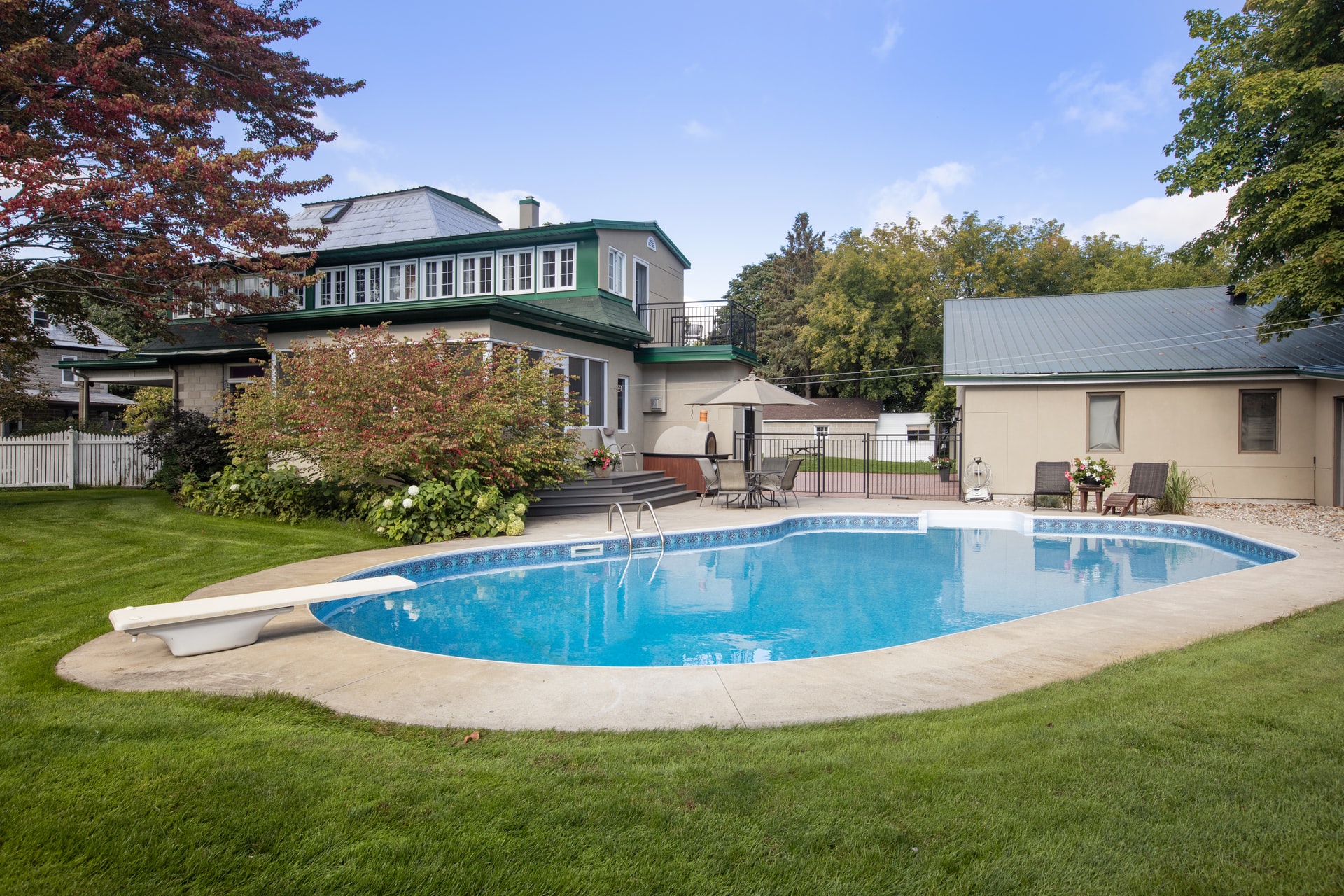You’ve dreamed of adding a swimming pool to your backyard for some time. Unfortunately, you don’t have the funds to make it happen, and it’ll take several years to save up enough money to cover the costs.
A pool loan could be an option to make your dreams of building an oasis in your backyard a reality. Plus, you may boost your property value by making this addition. Before applying for financing, you should first understand how they work and what to consider.
What is a Pool Loan?
A pool loan is a type of unsecured personal loan product designed to cover the costs of installing a swimming pool. It’s generally available through traditional banks, credit unions and online lenders. Despite its title, the funds can be used however you see fit since it’s a personal loan.
How Does a Pool Loan Work?
Loan proceeds for pool loans are disbursed in a lump sum and payable in equal monthly installments over a set period. The interest rate is fixed, and your cost of borrowing will depend on your creditworthiness. Lenders also consider your income, which determines a loan amount you can comfortably afford to repay.
Benefits of Pool Loans
Pool loans give you the extra capital you need to get a pool. These loan programs break down a large purchase into reasonable monthly payments. You can also improve your credit score by making on-time payments for these loans.
Downsides of Pool Loans
While pool loans have their benefits, you will end up with additional debt and monthly payments. Pool loans can impact your budget for a while, and you will end up with higher rates if you opt for unsecured loans like personal loans. Home equity loans and HELOCs have better rates but also involve using your property as collateral. Not everyone wants to take that risk.
Things You Should Consider Before Getting a Pool Loan
Consider the steps you will need to take to get a home improvement loan or how you will secure the funding to pay for the swimming pool. To help you decide, see here some things to consider before taking out a loan:
1. Loan Amount
Some lenders offer more generous loan amounts than others. It’s important to only consider lenders that can finance a swimming pool for the purchase price you need.
2. Fixed-rate vs. Variable-rate Loans
Fixed-rate loans have steady monthly payments that do not change. Loans with variable rates are less predictable since the interest rate fluctuates based on the market. You can end up with lower payments if you opt for a variable-rate loan, but a soaring interest rate can suddenly increase your monthly payments.
3. Interest Rates and Loan Terms
Consumers should assess the different rates from various lenders. The loan term also plays a role, as you will face higher monthly payments with a 3-year loan than a 5-year loan. An extended loan term means a lower monthly payment, but you’ll pay more in interest. But if your goal is to pay the pool off fast, opt for a shorter repayment period.
4. Monthly Payments
How much can you afford to pay each month toward a pool loan? Be sure to run the numbers before applying for a pool loan so you’ll know how much pool you can comfortably afford to finance.
5. Understanding All the Costs and Additional Loan Fees
Does the lender charge loan origination fees? Are there late payments or early repayment penalties to be mindful of? Loans have several expenses that go beyond the interest rate. You’ll have to contend with closing costs and additional fees if you get a loan. Credit cards have high APRs and cash advance fees.
6. Loan Requirements
What are the eligibility requirements for a swimming pool loan? Do you meet the qualifications for the lenders you’re considering?
Ways to Finance the Construction of Your Pool
There are many ways you can pay for your home renovations, including a pool addition to your home. Let’s review some of the options, from home improvement loans to more traditional ways of borrowing.
1. Use Your Savings
If you want to avoid debt, this is the best option to finance the construction of your pool. The downside is that you could spend several months or years coming up with the funds needed to pay for a pool since costs can range anywhere from $10,000 (above-ground pool) to $80,000 or more (above-ground pool). And if you already have a sizable amount of funds saved up, paying for a pool could wipe out your account.
2. Apply for a Personal Loan
Personal loans are the preferred way to finance swimming pools. You’ll need good or excellent credit to qualify for the best interest rates, and the fees are minimal. Another significant benefit is that it’s unsecured, so your home won’t be at risk of foreclosure if you fall behind on the loan payments.
3. Get a Pool Loan Through The Dealer
If you purchase your swimming pool through a dealer, they may offer in-house financing. Unfortunately, they often come with higher interest rates that could cost you a fortune over time. Still, dealer financing could work if you’re unable to qualify for other forms of funding.
4. Tap Into Your Home Equity
Do you have a ton of equity built up in your home? A home equity loan or home equity line of credit may be ideal to finance pool construction as borrowing costs are generally lower than what you’ll find with personal loans and credit cards. Plus, you’ll have an extended period to repay what you owe.
Home equity loans allow you to make fixed monthly payments with a loan term ranging from 5-30 years. HELOCs offer variable interest rates and lower monthly payments during the draw period. You can draw from a HELOC for up to 10 years. Then, the remaining balance gets converted into a loan with a term as long as 20 years.
5. Home Improvement Loans
You can take out a home improvement loan for your new pool. A pool adds value to your home and qualifies as a property upgrade. Pools can add several percentage points to your property’s value, especially if you live in a warm area. You can get a lower rate if you have a good credit score.
6. Personal Loans
These loans are unsecured and offer quick access to cash. Many financial institutions offer these loans and request basic information like your ID, Social Security Number, and proof of income. Most of these loans have a fixed rate, which is a good option for people who want stable monthly payments.
Some lenders only run soft credit checks for these loans. It is possible to get financing with this option if you have bad credit, but a good credit score will give you more loan options. Most lenders deliver these funds within 1-3 business days.
7. Credit Cards
Credit cards offer rewards and a readily accessible credit limit. However, the high interest rate and cash advance fees don’t make a credit card the best financing option for a pool.
8. Cash-Out Refinance
This is a good option for pool financing if you aren’t happy with your current mortgage. A cash-out refinance lets you tap into home equity, avoid a second mortgage, and change your loan terms. You can add more years to the backend of your mortgage to reduce your monthly payments.
How to Apply for a Pool Loan
You can follow these steps to apply for a pool loan and get the financing that you need for a new swimming pool.
Determine Your Budget and Loan Amount
It is a good idea to review your finances before determining the type of loan to get. A closer review of your finances will help you determine how much you can afford for a monthly installment loan payment. You can also decide if you would prefer an above-ground backyard pool or an in-ground pool.
Check Your Credit Score
Making sure you qualify for financing before submitting a loan request can save a lot of time. Lenders will look at your FICO score to determine if you qualify for a loan. It’s a good idea for homeowners to look at this score and build it up before applying for a loan. A higher credit score can give you a competitive interest rate and access to the best pool loans.
Choosing Your Loan Type
HELOCs, home equity loans, personal loans, credit cards, and home improvement loans are some of the available options. You should assess your financial situation before taking out a new loan to cover pool costs.
Shop Around for the Best Interest Rates
A pool installation can get expensive, but you can save money by comparing multiple lenders. You can find a lender that offers a reasonable rate and term length if you shop around. You may also find a high loan amount if you look beyond your primary lender.
Submitting an Application
Once you find the best fit for your finances, the final step is to submit an application. Lenders will request basic information like your ID, Social Security Number, and proof of income. Lenders assess this information to verify your identity and confirm if you are likely to make on-time monthly payments.
Conclusion: Should You Get a Pool Loan
A pool loan can make it financially feasible to buy a swimming pool. The installation of a swimming pool costs thousands of dollars, and not everyone has that type of money in their savings accounts. If you want to add a pool to your home for unforgettable memories, a pool loan can be a good idea. Adding a pool to your property will also increase its value.







